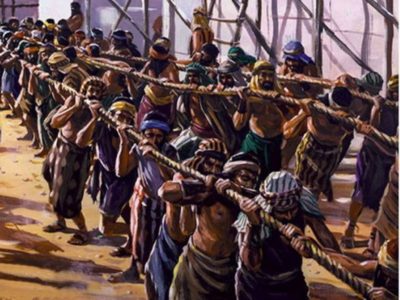God’s word meets us where we are in our slavery,
and shows us the way toward responsible stewardship.
—David Chilton
Poverty and Charity
 Scripture speaks plainly about the devastation wrought in this world by sin. It also speaks to us of God’s temporal judgment against sin. Poverty is normally the result of one or both.
Scripture speaks plainly about the devastation wrought in this world by sin. It also speaks to us of God’s temporal judgment against sin. Poverty is normally the result of one or both.
A man may be poor because of his own sin — meaning he may be slothful or a poor steward of what he does earn. Or a man may be poor because of the sins of others. He may the victim of common thieves or of an oppressive political system. In addition, a man may be poor because he’s lost his house and lands to famine, fire or flood. He may have even lost his ability to work because of illness, age or accident.
The truth is, the Word of God approaches poverty realistically. It doesn’t propose to eradicate poverty in a generation or even a millennium. Moses wrote, “For the poor shall never cease out of the land” (Deut. 15:11), and Jesus said, “Ye have the poor always with you” (Mark 14:7). But God’s Word does offer practical ways that God’s people can help the poor without subsidizing sloth and wickedness or surrendering immense powers to a welfare State. To understand the principles involved, we need to look deeper into the institutions and practices God laid down for Israel in the Mosaic Law.
Charity in Israel
First, practical charity began with the family and the extended family. This was implicit in, “Honor thy father and thy mother” (Ex. 20:12). In fact, Jesus taught that a failure to provide for one’s father and mother in their old age was tantamount to cursing them … a capital crime in Israel (Mark 7:9-13). Beyond this, the Mosaic Law said that those who were in bondage because of debt could be redeemed by a near relative, a kinsman-redeemer (Lev. 25:25, 48). The kinsman-redeemer could also buy back lands that had been mortgaged or sold. Though this particular office finds fulfillment in Christ (1 Pet. 1:18-19), the general principle that family is responsible to help family is still binding (1 Tim. 5:8).
Second, farmers in Israel were not to harvest the corners of the fields or collect every cut stalk. They were to always leave some of the grain in the fields for the poor to gather (Lev. 19:9-10; Deut. 24:19-21). This law provided the poor an opportunity to work for their food. The book of Ruth shows a young woman supporting herself and her mother-in-law by gleaning in local fields. Today, those who collect recyclables for cash are doing something akin to gleaning. Organizations like Goodwill also employ a stylized sort of gleaning.
 Third, every third year the tithe (or, some say, an additional tithe) was designated for the poor (Deut. 26:12). This poor tithe was administered by the local elders and given to those who were truly in need. These funds could become capital to start a new business of some sort. For those unable to work, they would be savings to be carefully managed for the next three years. In both cases, the tithe promoted financial responsibility rather than constant dependence.
Third, every third year the tithe (or, some say, an additional tithe) was designated for the poor (Deut. 26:12). This poor tithe was administered by the local elders and given to those who were truly in need. These funds could become capital to start a new business of some sort. For those unable to work, they would be savings to be carefully managed for the next three years. In both cases, the tithe promoted financial responsibility rather than constant dependence.
Fourth, the law encouraged zero-interest charity loans to those in need (Deut. 15:7-11). In fact, God commanded His people to honor requests for such loans. The lender could ask for collateral, but only within limits. “Thou shalt not . . . take a widow’s garment to pledge” (Deut. 24:17). Such charity loans were short term (a maximum of six years), and if the borrower was unable to pay back the loan by the Sabbath year, it was automatically cancelled.
Fifth, those who could not pay their debts or who were otherwise in a weak financial position could indenture themselves to another Israelite for up to six years.
Indentured Service in Israel
The indentured servant (or his creditor) received a large lump sum up-front but no wages thereafter. His employer would be responsible for all of his basic necessities. The term of service was limited to a maximum of six years. The servant went free in the Sabbath year (Ex. 21:2; Deut. 15:12-18). When the master released him from service, he was to furnish his former servant liberally out of his flock, threshing floor and wine press (Deut. 15:14) — that is, he was to give him the resources necessary for a new beginning as a free man.
This sort of service was a structure or framework in which the indentured man had an opportunity to learn responsibility and self-discipline. The indentured servant would live with and work for a successful farmer or businessman … someone wealthy enough to buy his services. He would stay busy and on schedule. He would see how a self-disciplined man approaches his work. He would learn new, productive skills. He would share in his master’s family worship and accompany his master to Sabbath worship where he would hear the Word of God.
Of course, no change of externals can change the heart. No imposed discipline can renew the character. But for the man who submitted to this service in true faith, the potential for learning, growth and self-improvement were tremendous.
Modern Application
The laws governing this six-year indenture were tied to Israel’s Sabbath years. Those seventh-years Sabbaths were an extension of the seventh-day Sabbath and were designed specifically for the Promised Land. Their reckoning began with the completed conquest of Canaan. The six-year indenture, then, was wrapped up with the temporary and typical elements of the Mosaic economy. In its Old Testament form, then, it is no longer strictly binding in the New Covenant era.
That said, the idea of a “limited indenture” still has much to recommend itself as long as both parties are accountable to godly courts. Indentured service was practiced in the American colonies with some degree of success. It was certainly a huge advance over debtors’ prisons and a hopeless grinding poverty.
Finally, it is important to note that this approach to welfare … or workfare … is completely free of big bureaucracy and endless governmental entanglements. The State’s only role in the whole matter is to enforce the indenture contract. Not just that, but this would be a job for local courts and not some huge national bureaucracy. In these examples, as always, God’s mercies promote life, freedom and personal responsibility. Statist answers to the questions of poverty called “tender mercies of the wicked” in the Bible … have always promoted poverty and tyranny at every level of society.
What do you think? Would a “limited indenture” work today? Share your thoughts in the section below:
 Off The Grid News Better Ideas For Off The Grid Living
Off The Grid News Better Ideas For Off The Grid Living




